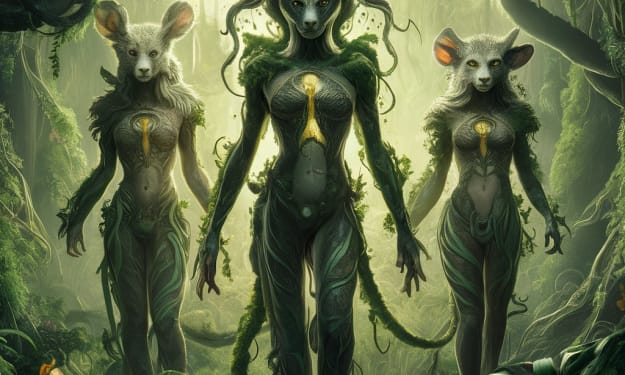Too Dark Without It
Life's Too Dark Without at Least One Chance for Things to Change Direction

Mothram turned the locket in his fingers and thought about the lyrics to an old song from the twentieth century he had heard one time while working in the archives.
I’ve been locked inside your heart-shaped box for weeks.
The object he was examining no longer twinkled with its former gumball luster. Now, metallic cobalt and emerald hues marbled their way across its surface. Stomach acid really does a number on cheap jewelry, only this wasn’t cheap, and it wasn’t jewelry.
The locket Mothram held looked like an ordinary heart-shaped ornament a girl would wear around her neck, the kind you could stuff with a little picture of your mother or your sweetheart, but it was actually one of the most sophisticated pieces of equipment on either pole—a container for storing the most precious treasure in existence.
Only now it was ruined because that idiot girl swallowed it just before they had taken her into custody. He immediately gave orders to flush it out of her. They funneled enough Gojuice down her gullet to melt the rest of the East Antarctic Ice Sheet, but by the time it came out, her digestive system had already done its worst. The locket rested heavily in his palm. He couldn’t hear the humming of the cryotech or feel its vibrations. He did not open it. What was the use? He should have been grieving, pulling out his hair, and throwing office furniture, but he couldn’t process the reality of what she had done. All that was left of hundreds of the earth’s species lay dead in the palm of his hand, and all he could do was laugh, picturing her trying to swallow the jagged ornament chased by its long gold chain.
Mothram thought about his dad. When he got sick, the doctors laid out treatment plans, surgical options, best case scenarios. He and his parents held onto all of it. They tried chemo. When that didn’t work, they tried radiation. When that failed, they tried a different kind of chemo, then immunotherapy, then surgery, then back to chemo. Then they took the five-day underground shuttle to the North to get a second opinion. Two years of torture. They tried every treatment, followed every specialist’s advice. As long as there was one more thing they had not tried yet, they still had hope. But one day they reached the end of their options, and there were no more treatments, no more surgical options, no more experimental therapies. He remembered the last time he rode in the back of the ambulance with his dad on the way to the hospital. He told him not to give up, that they just needed to get to the hospital and Doc Roper would fix him right up. His father, lying painfully on the rocking gurney, shifted his watery eyes toward Mothram and took his hand. “Not this time, son,” he said.
Now again he had reached the end of hope’s road. But this time it wasn’t just his father who was going to die; it was the entire human race. That little piece of jewelry was all that was left of hundreds of species—bees, cattle, waterfowl, rodents, dogs, snakes, elephants, elk, deer, wildcats—a menagerie of earth’s Golden Age, before the poles melted, when the planet teemed with life and humanity lived on every square inch. Before the fires came and the seas rose and green forests disappeared into desert wastelands. The only thing crawling the crusty wilds of the Middleland now were cockroaches, flies, and ants, and they were starving.
In the middle of the twenty-second century the scientific community and the politicians finally decided to do something about the environmental crisis. But it was too late to save the planet’s ecosystems. As a last-ditch effort, they began storing DNA in preparation for what they called the Reset—a sabbath for the earth, lasting centuries maybe, for its fields to lie fallow and heal. According to the plan, once the earth recovered, they would reseed it with lifeforms that once roamed its meadows, forests, mountains, lowlands, beaches, and jungles—assuming they developed the technology to do so—and the world’s ecosystems would be restored. Earth would sit up, stretch, shake the burial wraps from her face, and emerge from hibernation like Lazarus from the grave.
By the time most of the life that had once been on earth became extinct, the scientists with the Observatory for Earth Reset (OVER) had stored enough DNA to reseed the earth in six separate storage capsules that looked like gold heart-shaped lockets. Overnight, these little ornaments became the most coveted objects on the planet. Billionaires who liked taking items out of circulation whose accessibility would save lives—commodities like antibiotics, petroleum, and Cezanne paintings—offered to pay a king’s ransom to get their hands on one. Of course, those who stole the lockets mishandled them and destroyed their precious cargo until there was just one functioning storage capsule left. Until a few days ago it had been held under maximum security at OVER’s headquarters. Then a well-funded black ops team raided the facility and somehow managed to steal it.
The detective turned humanity’s last hope over in his hands. He was at the end of the road again. No more second chances. All was lost.
Mothram had to figure out what to do with the girl. Questioning her was useless, but he rose from his chair anyway, pocketed the locket, and marched down to the interrogation room where they were holding her. She didn’t look at him when he threw open the door. She wore black from head to toe and sat uncomfortably in a plastic chair, hands cuffed and chained to the table in front of her, staring at her knees. She was about twenty, pale, and her dark hair lay matted and wet across her forehead. She looked like she still needed a toilet, but the guard outside her door said she hadn’t made a peep for the last hour. Her bottom lip bled where they had forced the Gojuice down her mouth. Mothram noticed her large hazel eyes, defiant above the dark circles made by her ordeal. Even after all she had been through, she was really quite beautiful.
He cleared his throat and took a seat in the chair across the table from her. “Do you realize what you have done?” he barked.
“A lady doesn’t discuss such things at the table,” she said, mocking him with a smile. For the first time, he noticed a spray of freckles across her cheeks.
“That little stunt you pulled may have been the worst disaster of the twenty-fourth century. You just nuked Noah’s ark!”
The girl shrugged.
“That locket held the genetic material of hundreds of extinct organisms! It was the last DNA banking capsule in the South Pole! You may have destroyed any hope of ever bringing life back to earth. That little trinket held the ecosystem, renewable protein sources, cross-pollination, biodiversity, and the food chain—humanity’s last hope! And you’ve literally flushed it away!”
The girl laughed bitterly. “Your government was bound to lose all three, just like the North. It was only a matter of time. That black ops team—whoever they were—didn’t have much trouble getting away with it.”
“You toy with existence like it’s some kind of game.”
“Why do you assume they’re playing a game? Maybe they’re saviors. Did you ever think about that?”
Mothram sneered. “They’re petty thieves, and you’re one of them!”
The girl tried to stretch by arching her back from a seated position and yawned. “You can’t prove anything.”
Mothram’s temper soared. “Then how do you explain this?” He shoved the locket in her face, and the buzzing fluorescent lights revealed, to his embarrassment, fecal matter in the hinges and the tiny clasp.
“Did you open it?” she asked.
“Of course not. The scientists may still be able to salvage a few strands.”
“Open it.”
“You’re crazy!”
“You say it’s the world’s most valuable DNA banking capsule. I say it’s cheap jewelry. So let’s open it and prove I’m right so I can get out of this dump.”
Mothram looked at her warily. He still had that song stuck in his head.
Wait. Wait. I got a new complaint.
“Either you’re right, and I ‘nuked Noah’s ark,’ or the locket’s worthless. Either way, you’ve got nothing to lose. Open it, or I’m calling my lawyer.”
Mothram looked at the locket and then back at her. If she was bluffing, she was better than anyone he had ever seen while playing poker at the Faraday casino.
He turned the locket over in his hands as he had when he had been alone in his office. Before, the object lay heavy and significant in the palm of his hand, but now—now it felt cheap, worthless. He used his fingernails to pry it open a notch. No blast of cool air from the cryotech, no whirring mechanical noises. Could she have been telling the truth?
He opened it the rest of the way. Staring back at him from a picture printed onto a thumbnail-sized piece of cardstock shoved into the back of the locket were the dull, uncomprehending eyes of a dodo bird.
Mothram’s chair scraped the floor as he stood up. He stared hard at the girl for a moment and then walked to the door, opened it, and summoned the guard. “Release her. We can’t hold her without evidence.”
He returned to face her at the table. She smiled defiantly. Blood ran down her chin. “You’re up to something,” he said. “I don’t know what it is, but we have witnesses who saw you with the team that raided the facility. The locket’s missing, that much I know, and I think you know where it is.”
“I don’t know what you’re talking about,” she said, locking him in a hard stare.
This girl has been up all night and has just had every nutrient flushed out of her. It’s a wonder she can lift up her head, let alone muster the energy it takes to stare down a police detective.
“Don’t even think about leaving town,” said Mothram. “We’re watching you.”
The guard uncuffed her and started to lead her out of the room. As she passed Mothram, she leaned in close so he could hear her say in a low, husky voice, “You might want to wash your hands. Your fingers stink.”
There’s that song again.
Forever in debt to your priceless advice.
Mothram went back to his office and shut the door. At his desk, he examined the locket again, and the old feeling of hope burst in his heart like a matchstick flame. He had lived without it for the last hour, and he had to admit he was grateful for its return. Life was too dark without at least one chance for things to change direction—however small it might be. The locket was in the wind, but maybe it was still functioning, maybe they could recover it.
He opened the locket and picked at the little picture of the dodo bird until it came loose. He turned it over. On the back in tiny letters it read, WE ALL WANT THE SAME THING.
The hour was late, and Mothram had seen enough for one day. He opened a drawer, threw the locket somewhere into its recesses and walked out whistling that tune that was still in his head.
About the Creator
Drew Kizer
I write short fiction. Mostly stories about doubt, tragedy, faith, hope, and redemption.
Enjoyed the story? Support the Creator.
Subscribe for free to receive all their stories in your feed. You could also pledge your support or give them a one-off tip, letting them know you appreciate their work.






Comments
There are no comments for this story
Be the first to respond and start the conversation.